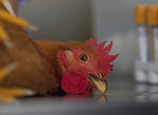
WASHINGTON, April 11 (Xinhua) -- A clinical trial involving 1,300 premature infants "failed to adequately inform parents of the reasonably foreseeable risks" of blindness, neurological damage and death, according to a federal department letter recently made available online.
The March 7 letter from the Department of Health and Human Services, which was publicized earlier this week by the consumer advocacy group Public Citizen, concluded the research conducted between 2005 and 2009 at 23 prominent research facilities throughout the country, including Stanford University School of Medicine, Yale University School of Medicine, Brown University, Duke University and University of Alabama at Birmingham, was "in violation of the regulatory requirements for informed consent."
In the study, premature infants were given different amounts of oxygen, a critical component of their care, but the consent forms for the study did not disclose to the babies' parents any of the risks of the experimental oxygen management interventions, including risks of severe retinal damage, possible blindness, neurologic injury and death.
Ultimately, 130 babies out of 654 in the low-oxygen group died, in comparison to the 107 babies out of 662 who died in the high-oxygen group.
"The word 'unethical' doesn't even begin to describe the egregious and shocking deficiencies in the informed-consent process for this study," said Dr. Michael Carome, deputy director of Public Citizen's Health Research Group.
"The failure to disclose such critically important information about the research undoubtedly directly affected parents' decisions to enroll their extremely premature infants in this study. It is highly likely that, had they been appropriately informed about the nature of the research and its risks, many, if not most, parents would not have allowed their babies to be in this study."
Richard B. Marchase, vice president for research at the University of Alabama at Birmingham, told the New York Times he had assured the federal agency, in the future, "we will to the best of our ability let the subjects or their parents know as thoroughly as possible what previous studies suggest in terms of risk. We are going to be very sensitive to that going forward as we look at these consent forms."
















 Photo story: Nostalgia in a small telephone booth
Photo story: Nostalgia in a small telephone booth


![]()
